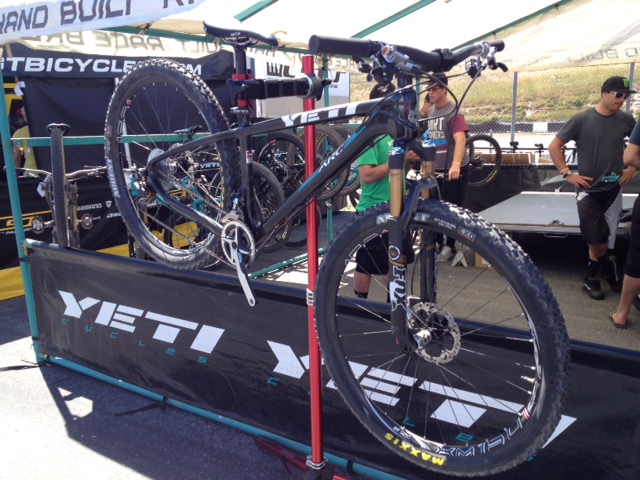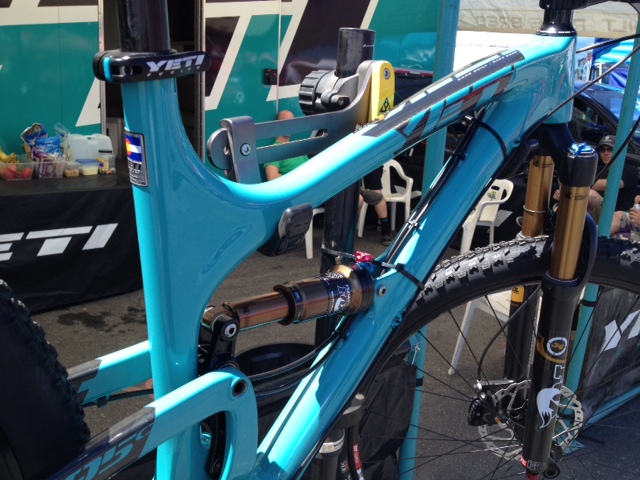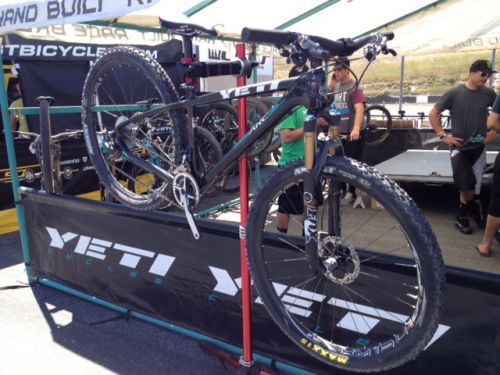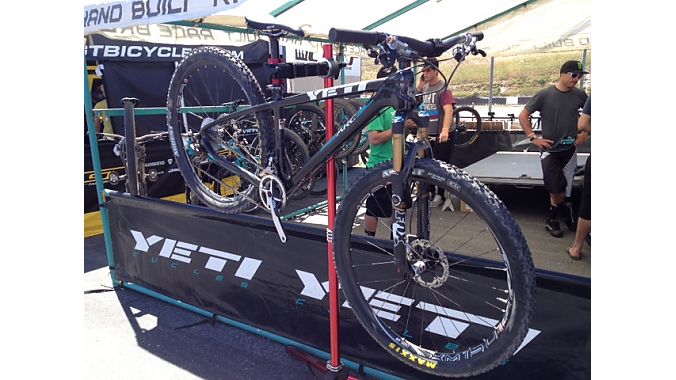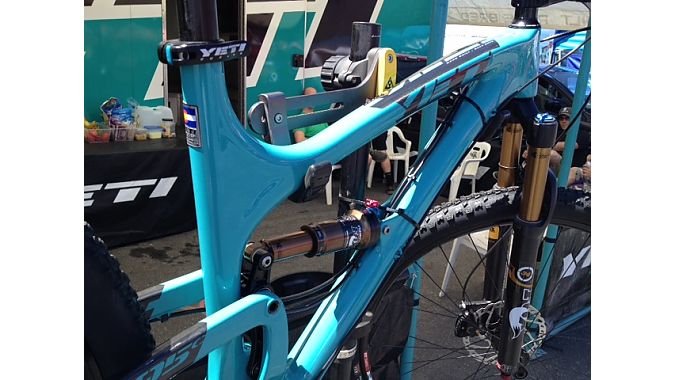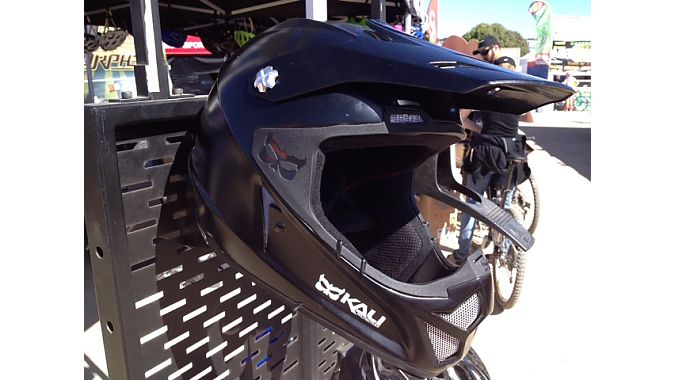MONTEREY, CA (BRAIN) — Confession time: We got out to the Otter a bit late, having committed ourselves to the Bicycle Leadership Conference and IBD Summit in Monterey through Thursday night. Still, there was plenty to discover when we roamed the dusty but thankfully sunny lanes of Laguna Seca on Friday. A smattering of what we saw:
Yeti
Even though Yeti spilled the dirt on its two new rigs via email early Thursday before the sun had a chance to shine down on Sea Otter’s second day Friday, the bikes were still something to behold in person.
The SB-95 Carbon 29er trail bike tips the scales a full two pounds lighter than its already well-reviewed aluminum counterpart. It also retains its predecessor’s slack-for-big-hoops 69-degree head angle, stable-pedaling Switch Link suspension that changes direction mid-stroke, and low BB height.
It comes as either a frameset or a complete with three build options.
Yeti also introduced its ARC Carbon cross-country and enduro hardtail. Like most of the company’s bikes, the ARC Carbon is designed to perform in the rocky conditions Yeti’s employees ride near their factory in Golden, Colorado, said spokesman Mark Riedy.
It’s light at far less than 3 pounds, but this is no twitchy race rocket: A120-millimeter fork yields a 69-degree head angle, and the frame has internal routing for dropper posts.
It rolls on 29-inch wheels in all sizes except small and extra-small, which take 650b hoops. Nice nod to short-statured guys and gals.
KS Suspension
Building on the success of glowing reviews for its LEV all-mountain and enduro dropper seatpost, KS showed a prototype of its stunningly light LEV Carbon. Like the original LEV, the actuating cable connects at the base of the post, so there’s no cable growth when triggered at the handlebar lever.
The hope is that the 325-gram post—200 grams lighter than its predecessor—will open up the dropper market to cross-country and cyclocross racers, said KS’s Rick Taylor. “You’re really getting down to the weight of a static post at that point,” he said.
That lower weight is achieved by fabricating the outer post, lower seat clamp and coupler housing out of carbon fiber. The internal slider and upper clamp are aluminum. The setup gets a little bling with a carbon lever attached to an aluminum clamp at the handlebar.
Maximum drop is 65 millimeters, compared with up to 150 mil for the regular LEV—just enough to inspire confidence on XC course descents or help cyclocross racers with their on/off the bike. In fact, the prototype post has seen substantial saddle time under pro Brian Lopes on the ’cross circuit, Taylor noted.
The LEV Carbon should be available to dealers around the time of Interbike in September, with MSRP about $600, Taylor said. … Yep, that’s far and away a new high for a company already topping the dropper price range with the $400 standard LEV.
KS is also bringing its internally routed LEV Integra to the aftermarket. With 100 to 150 millimeters of infinitely adjustable drop, the post has fewer setup and maintenance headaches thanks to its cable-pull—rather than hydraulic—design for frames with internal routing, Taylor said. It fits 30.9- and 31.6-millimeter seat tubes and tips the scales at 500 to 570 grams.
Raleigh
Raleigh lightens the load for cyclocross racers both on the course and in the back pocket with its 2014 lineup unveiled in Monterey.
The entry-leval RX 1.0, available in versions including a women’s design down to a size 48, features a lighter 6061 aluminum tube set, tapered headtube and seat tube, new proprietary Raleigh carbon fork, and SRAM Apex build. MSRP for both women’s and men’s versions comes in at $1,550.
The five-bike ’cross range for 2014 maxes out at $5,000—$2,000 less than the top of the 2013 line—for the carbon RXC Pro Disc race bike, kitted out with Ultegra Di2, Shimano CX75 disc brakes, Enve carbon fork and American Classic disc wheelset with custom graphics.
The full lineup should be available to dealers by June.
Kali Protectives
Up-and-coming helmet brand Kali let the bike media get their hands on three new developing brain savers.
Kali has its roots in the gravity market with its in-molded designs—a first for full-face helmets—and low-density foam that reduces weight but still disperses impacts to the dome thanks to triangular cones embedded under the shell.
The still-proprietary Shiva lid brings in new composite technology to shave weight down to a target of fewer than 1,000 grams and delivers a slimmer profile around the head—all while still being a DOT-certified bucket for motorcycle duty, too. Target MSRP; $400-plus.
Kali also showed its upcoming Phenom road model, first unveiled at last summer’s PressCamp but ready to hit the market in the next two to three months. It’s Kali’s sleekest road lid yet, and features a low-profile dial retention system and the company’s distinctive Bumper Fit padding.
Kali’s Supervents—PVC-like structures around broad vents to disperse impacts—not only go on the front of the Phenom, but on the back as well to improve air flow as well as protection. MSRP is targeted at around $180.
“Loka” means “everyone” in Sanskrit. So it makes sense that it’s the name of the first sub-$100 helmet to make Kali’s Bumper Fit tech available to a broader customer base. Bumper Fit is a thin layer of cush like Memory Foam that molds to the head to improve fit. The road lid is set to hit market at $99.

